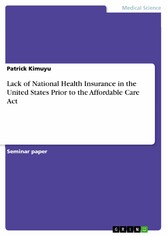Lack of National Health Insurance in the United States Prior to the Affordable Care Act
von: Patrick Kimuyu
GRIN Verlag , 2018
ISBN: 9783668730366
, 10 Seiten
Format: PDF
Kopierschutz: frei
Preis: 5,99 EUR
eBook anfordern 
Mehr zum Inhalt

Lack of National Health Insurance in the United States Prior to the Affordable Care Act
Seminar paper from the year 2018 in the subject Health - Public Health, grade: 1, Egerton University, language: English, abstract: The United States seems to be experiencing enormous challenges in public healthcare despite the numerous healthcare reforms, which have been enforced to enhance healthcare sustainability. For instance, the current burden of disease caused by obesity and its related health conditions appear to have become a potential healthcare problem because; the U.S Government has been spending colossal amounts of revenue to the healthcare sector to mitigate the issue. Recent healthcare reports indicate that, obesity consumes the highest percentage of healthcare expenditure and, this probably so because; obesity and its related health conditions such as cardiovascular disease, the heart disease and diabetes have been ranked among the top-five leading causes of mortality, in the U.S. In addition, other Non-communicable diseases such as cancer and arthritis are also exerting intense pressure on the U.S healthcare system. Secondly, the lack of national health insurance has emerged to be another significant challenge to the U.S healthcare, leading to the unprecedented surge of healthcare cost and inaccessibility to healthcare services. Healthpac (2013) states, '75% of all health care dollars are spent on patients with one or more chronic conditions, many of which can be prevented, including diabetes, obesity, heart disease, lung disease, high blood pressure, and cancer'. Currently, there are about 48 million uninsured people, in the United States, which translates to 16.3% of the total U.S population (DeNavas-Walt et.al. 2012). It is surprising that the U.S is one of the wealthy industrialized nations in the world but, it does not have a universal healthcare system, which involves national health insurance and, this has led numerous healthcare consequences (Healthpac, 2013). Therefore, this research will give an overview on the lack of national health insurance, in the United States.









